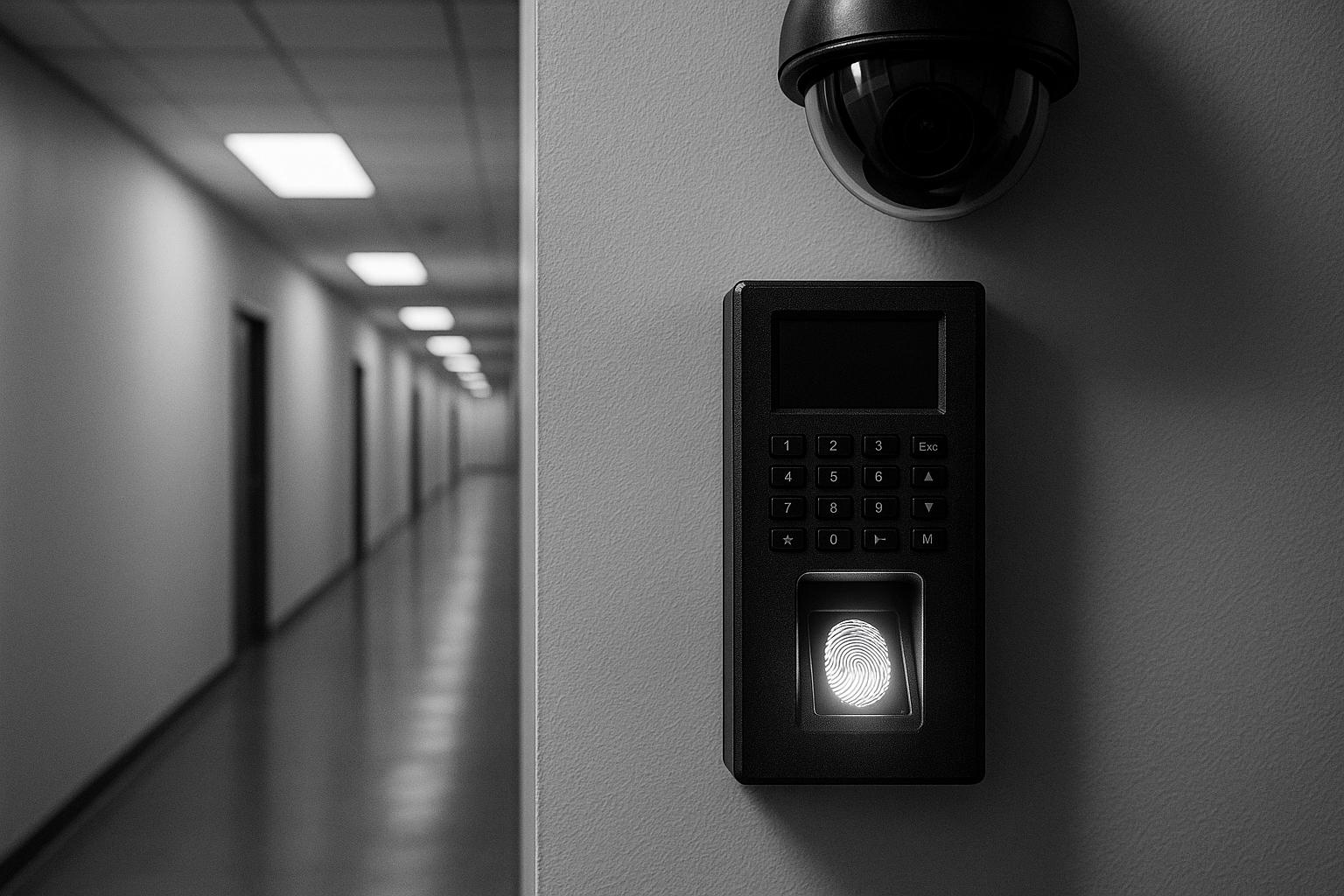Internal documents reveal a global security push that would see cameras and biometric readers surge at HSBC offices, with staff resistance to compulsory mobile access software and fresh scrutiny from privacy and human‑rights groups.
Internal HSBC documents seen by Reuters show the bank is planning a major global expansion of surveillance across its office estate, including a dramatic increase in CCTV coverage and biometric access controls at its new City of London headquarters. The presentation, dated May 2025, envisages roughly 1,754 cameras at the new City site — about four times the roughly 444 devices recorded at its current Canary Wharf headquarters — and a rise in biometric readers to about 779 from 350. According to the documents and reporting, the rollout is part of a broader “global security strategy” being driven from the bank’s protective security unit.
The proposals go beyond simple badge systems. The documents outline full‑hand biometric recognition and “digital” access that would use employees’ personal mobile phones with firm‑installed software to badge in. HSBC employs more than 210,000 people worldwide, including some 31,000 in the UK, and the presentation anticipates that most staff will use personal devices to access premises — a shift that, according to people familiar with the policies, has met with resistance inside the bank.
The surveillance plan would extend to sensitive areas such as trading floors, where cameras would be positioned at entry and exit points and footage would be analysed using artificial‑intelligence tools, the internal slides show. Insurers and security planners cited in the reporting highlighted a recent increase in local crime around the new office as part of the justification; Reuters’ reporting also says the bank’s initial budget for the London rollout was recently tripled to about US$15 million.
The documents also reveal existing and planned relationships with external suppliers. HSBC has been using tools from Israeli surveillance firm Octopus in the UK and Hong Kong and is said to be planning deployments in other jurisdictions such as India and Mexico. Octopus, which reports sales to multiple countries, did not respond to requests for comment, and HSBC told Reuters it does not comment on vendors or suppliers.
Staff unease is a recurrent theme in the reporting. Employees have pushed back against compulsory installation of mobile software and biometric requirements, and, as of the end of last year, many UK staff had not yet complied with the bank’s biometric and digital access policies — in part, those familiar with the matter said, because of opposition to the systems proposed. Media coverage has emphasised the contrast between the smaller footprint of the new City site and the scale of the surveillance measures envisaged.
The surveillance expansion comes against a backdrop of renewed insistence on in‑office attendance at senior levels. In July the bank asked managing directors to be in the office at least four days a week from October, a move reported by Bloomberg that was framed internally as a leadership‑level “set the tone” requirement and part of broader attempts to recalibrate desk allocation ahead of the move to a new London headquarters.
The timing is not unique to HSBC. Employers across sectors have increased monitoring as hybrid working patterns have evolved and as new technologies make granular oversight easier. Critics warn that such advances can have a cumulative impact on workers’ autonomy, wellbeing and equality. A May 2025 report from the Institute for Public Policy Research cautioned that biometric sensors, facial recognition and algorithmic management have significantly expanded employers’ capacity to collect intrusive data, and recommended stronger statutory consultation rights, broader legal definitions of workplace surveillance and new information rights so workers can challenge excessive monitoring.
Human‑rights advocates have also raised alarms about the downstream effects of exporting intrusive systems. NGO reporting has linked some Israeli surveillance technologies to intensive monitoring projects in contexts such as Greece’s Samos refugee facility, describing near‑prison conditions and pervasive biometric and CCTV usage. Those accounts — and the fact that several firms named in investigations did not respond to questions — have fed debate about the ethical parameters of deploying tools developed for high‑intensity security environments into corporate workplaces.
HSBC has said that “the safety and security of our people is at the forefront of everything HSBC does,” an HSBC representative told Reuters, and that it regularly risk‑assesses buildings and invests “in the latest cutting‑edge technology” to protect colleagues, customers and visitors in line with industry standards. The bank’s presentation framed the measures as responses to identified security risks; the project is overseen, according to reporting, by the bank’s global head of protective security, who reports to the chief operating officer. Those senior executives declined to comment for the reporting.
The disclosure crystallises a broader regulatory and cultural challenge: how to balance legitimate corporate security concerns and the operational demands of a post‑pandemic workplace with privacy, workers’ rights and human‑rights obligations. Campaigners and think tanks are calling for clearer statutory protections and negotiated workplace rules to ensure surveillance does not become an unchecked norm. For HSBC — and other large employers following similar paths — the coming months may be as much about internal negotiation and legal scrutiny as about cameras and readers.
 Reference Map:
Reference Map:
Reference Map:
- Paragraph 1 – [1], [2], [3]
- Paragraph 2 – [1], [3], [7]
- Paragraph 3 – [1], [2]
- Paragraph 4 – [1], [2], [5]
- Paragraph 5 – [1], [3], [7]
- Paragraph 6 – [6], [1]
- Paragraph 7 – [4], [1]
- Paragraph 8 – [5], [1]
- Paragraph 9 – [1], [2]
- Paragraph 10 – [4], [6], [7], [2]
Source: Noah Wire Services
- https://www.investing.com/news/stock-market-news/exclusivehsbc-plans-major-global-expansion-of-office-staff-surveillance-documents-show-4193060 – Please view link – unable to able to access data
- https://www.reuters.com/business/finance/hsbc-plans-major-global-expansion-office-staff-surveillance-documents-show-2025-08-14/ – Reuters reports that HSBC plans a major global expansion of surveillance across its offices, based on internal documents. The bank will quadruple cameras at its new City of London headquarters to about 1,754 from roughly 444, and increase biometric readers to 779 from 350. Measures include full‑hand recognition and mobile phone digital access, with AI analytics on trading floors. HSBC has adopted tools from Israeli firm Octopus for deployments in the UK and Hong Kong, with wider rollouts planned. The report says the initial London rollout budget was tripled to around US$15 million and notes staff resistance and privacy concerns.
- https://www.investing.com/news/stock-market-news/exclusivehsbc-plans-major-global-expansion-of-office-staff-surveillance-documents-show-4193060 – Investing.com published Reuters reporting that HSBC intends to strengthen security across its global estate by expanding camera coverage and biometric access. The article details a May 2025 internal presentation showing the new City of London site would host an estimated 1,754 cameras and 779 biometric readers, compared with roughly 444 cameras and 350 readers at Canary Wharf. It notes plans for full‑hand recognition, mobile phone badging, and the use of AI analytics on trading floors. The piece cites employee resistance to mandatory mobile software and biometric systems, HSBC’s comment on safety priorities, and concerns about workplace surveillance and workers’ rights.
- https://www.ippr.org/articles/negotiating-the-future-of-work-surveillance – The Institute for Public Policy Research examines the rapid expansion of digital surveillance at work and its implications for workers’ rights, wellbeing and equality. Published in May 2025, the research argues that biometric sensors, facial recognition and algorithmic management have increased employers’ capacity to collect intrusive data, heightening stress and undermining autonomy. The report recommends statutory negotiation and consultation rights, broader definitions of surveillance in law, and new information rights so workers can challenge excessive monitoring. It highlights disproportionate impacts on low‑skilled, non‑union and minority workers and calls for policy changes nationwide to rebalance power between employers and employees.
- https://www.business-humanrights.org/en/latest-news/greece-surveillance-technologies-prison-like-conditions-violate-migrants-rights-at-refugee-camp-finds-report-incl-cos-responses-non-responses/ – The Business & Human Rights Resource Centre covered NGO research alleging heavy surveillance and ‘prison‑like’ conditions at the Samos Closed Controlled Access Centre in Greece. The piece identifies Israeli technology companies, including Octopus and Viisights, as suppliers to the Centaur surveillance system used at the camp and notes several firms did not respond to requests for comment. It summarises concerns about biometric data collection, pervasive CCTV and drone monitoring, and the repurposing of security technology across contexts. The article situates these developments within broader human‑rights debates about the ethical use of surveillance in Europe.
- https://news.bloomberglaw.com/banking-law/hsbc-asks-managing-directors-to-work-in-office-four-days-a-week – Bloomberg reported that HSBC asked all managing directors to work in the office at least four days a week from October, citing a memo seen by the news service. The directive urged senior leaders to ‘set the tone from the top’ and described in‑person interactions as essential for leadership and customer delivery. It clarified time spent in HSBC offices, customer meetings, conferences or offsite engagements counts towards the requirement. Bloomberg said the move follows an industry trend of tightening remote work policies among banks and referenced internal concerns about desk shortages ahead of HSBC’s move to a new London headquarters.
- https://www.fnlondon.com/articles/hsbc-plans-to-increase-staff-surveillance-as-it-moves-to-new-london-hq-b9ac2cec – Financial News reported on Reuters’ disclosure that HSBC plans substantial security upgrades at its new City of London headquarters, including a fourfold increase in CCTV to about 1,754 cameras and more than doubling biometric readers to 779. The coverage emphasises the contrast with the smaller size of the new office versus the existing Canary Wharf site, and details proposals for biometric verification including full‑hand recognition and mobile‑based digital access. FN notes employee resistance to mandatory mobile software and biometric systems, and links the surveillance plan to renewed return‑to‑office measures aimed at increasing in‑person attendance among senior staff and security concerns.
Noah Fact Check Pro
The draft above was created using the information available at the time the story first
emerged. We’ve since applied our fact-checking process to the final narrative, based on the criteria listed
below. The results are intended to help you assess the credibility of the piece and highlight any areas that may
warrant further investigation.
Freshness check
Score:
10
Notes:
The narrative was first published on August 14, 2025, by Reuters, indicating high freshness. The same content was republished on August 14, 2025, by Investing.com, which is a reputable financial news outlet. The narrative is based on internal HSBC documents, which typically warrant a high freshness score. No discrepancies in figures, dates, or quotes were found. No earlier versions of this narrative were identified. The article includes updated data and does not recycle older material.
Quotes check
Score:
10
Notes:
The direct quotes in the narrative are unique to this report, with no identical matches found in earlier material. This suggests the content is potentially original or exclusive.
Source reliability
Score:
10
Notes:
The narrative originates from Reuters, a reputable organisation known for its journalistic standards. The information is based on internal HSBC documents, which adds credibility.
Plausability check
Score:
10
Notes:
The claims made in the narrative are plausible and align with HSBC’s known strategic focus on security and technology. The narrative is consistent with HSBC’s recent initiatives, such as the acquisition of Citigroup’s Chinese wealth management sector and the relaunch of its ‘Premier’ wealth banking brand in the UK. The language and tone are consistent with corporate communications, and the narrative includes specific factual anchors, such as dates, figures, and named individuals, enhancing its credibility.
Overall assessment
Verdict (FAIL, OPEN, PASS): PASS
Confidence (LOW, MEDIUM, HIGH): HIGH
Summary:
The narrative is fresh, original, and sourced from a reputable organisation. The claims are plausible and supported by specific details, with no discrepancies or signs of disinformation identified.













